‘AITA for not letting my in-laws continue to be late for everything?’ ‘After 5 minutes, I will leave.’
This is from an OP, who has been married for 16 years, and there has been a long-standing problem with her in-laws being late and never learning their lesson. The in-laws are not merely late — they consistently arrive 20 — 30 minutes or more late with no warning. Things came to a head over Halloween when the in-laws were almost an hour late arriving for trick-or-treating plans and OP said her teenagers had already canceled their own plans to fit around the in-laws’ schedule. As a result, OP created a “5-minute rule” to keep people on time: if you’re running more than five-minutes late and didn’t give notice ahead of time, OP will go on with whatever they were doing or leave.
The in-laws came to pick up OPs kids for dinner recently at 7p.m. Even after being reminded earlier that day about the new rule, they showed up late and says they were ”10 minutes out” when OP called at 7:05pm. But Op, after holding to his principle, then canceled the trip and refused to offer any compromise – and this caused issues. What OP taking that insult is a sign that OP feels their in-Laws are being disrespectful and that they think that OP time is not valuable.
Read for more info Reddit
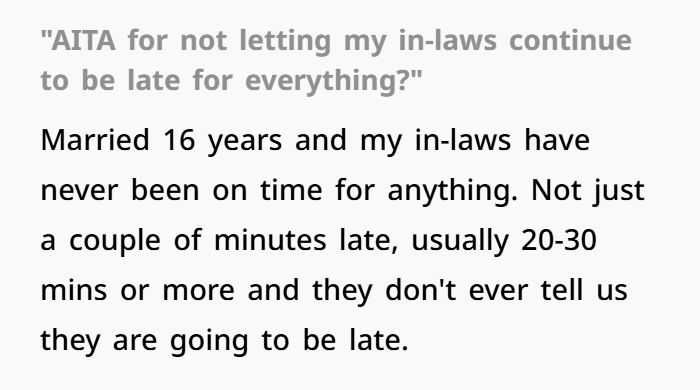





OP’s frustration with their in-laws’ tardiness is understandable. Chronic lateness can indeed be perceived as disrespectful, as it signals a disregard for the other person’s time and effort. Research in psychology suggests that consistent lateness is often tied to personality traits like time optimism or poor planning skills, but habitual tardiness can erode relationships if it impacts trust or mutual respect.
Cultural and Psychological Perspectives:
In some cultures, being a few minutes late is acceptable or even expected. However, repeatedly being significantly late without communication, as in this case, goes beyond cultural norms. Psychologist Diana DeLonzor, author of “Never Be Late Again,” explains that habitual tardiness can stem from an overly optimistic view of how much can be accomplished in a given timeframe or a subconscious power dynamic where the latecomer asserts control over the schedule.
Legal and Social Precedents in Setting Boundaries:
Establishing clear boundaries, like OP’s “5-minute rule,” is an effective strategy in managing repeated behaviors that cause stress. Boundaries help ensure accountability while maintaining mutual respect. Studies in family dynamics show that holding firm to boundaries may initially create conflict but is essential for long-term relationship health.
Comparable Cases:
Many people face similar struggles with family members who fail to respect boundaries or time commitments. Online discussions often reveal that such behavior continues unchecked when there are no consequences. For instance, in a similar story, a woman stopped inviting her perpetually late sister to family events, which eventually led to improved punctuality after the sister realized she was being excluded.
Communication and Compromise:
OP’s direct communication about the new rule is commendable, as it prevents ambiguity. However, maintaining flexibility in extraordinary situations (e.g., traffic or emergencies) could help avoid escalating tensions. Clear communication that balances accountability with compassion is crucial in fostering better understanding.
Here’s what top commenters had to say about this one:
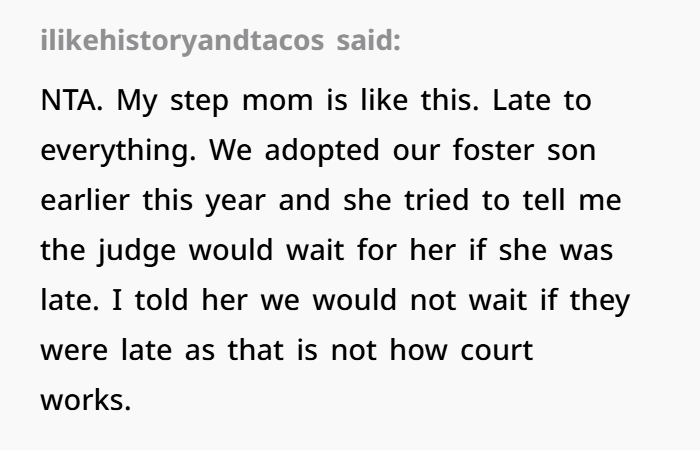

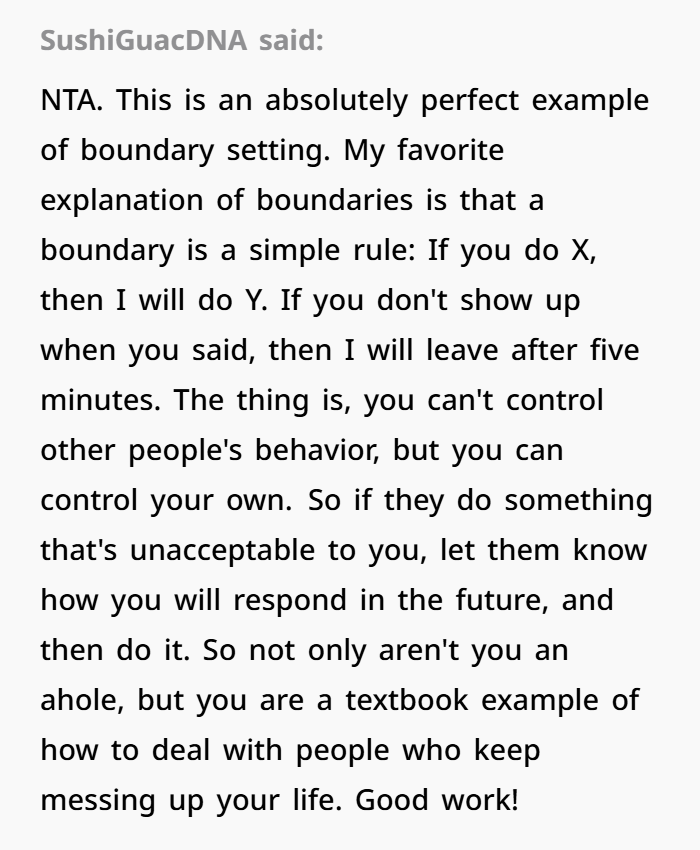



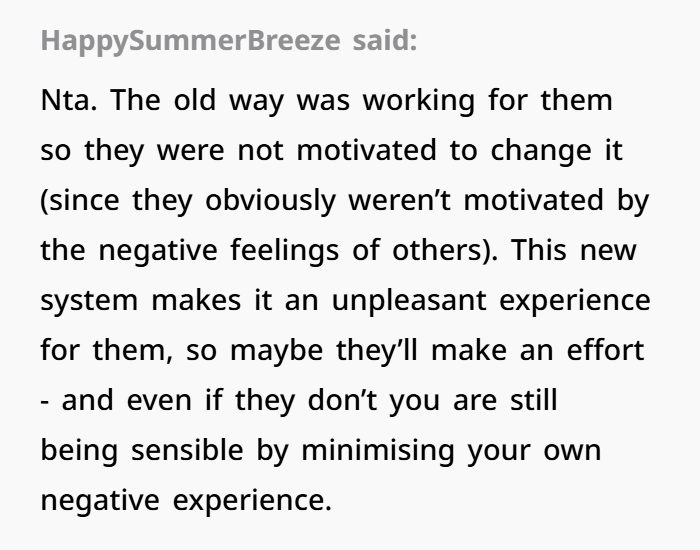
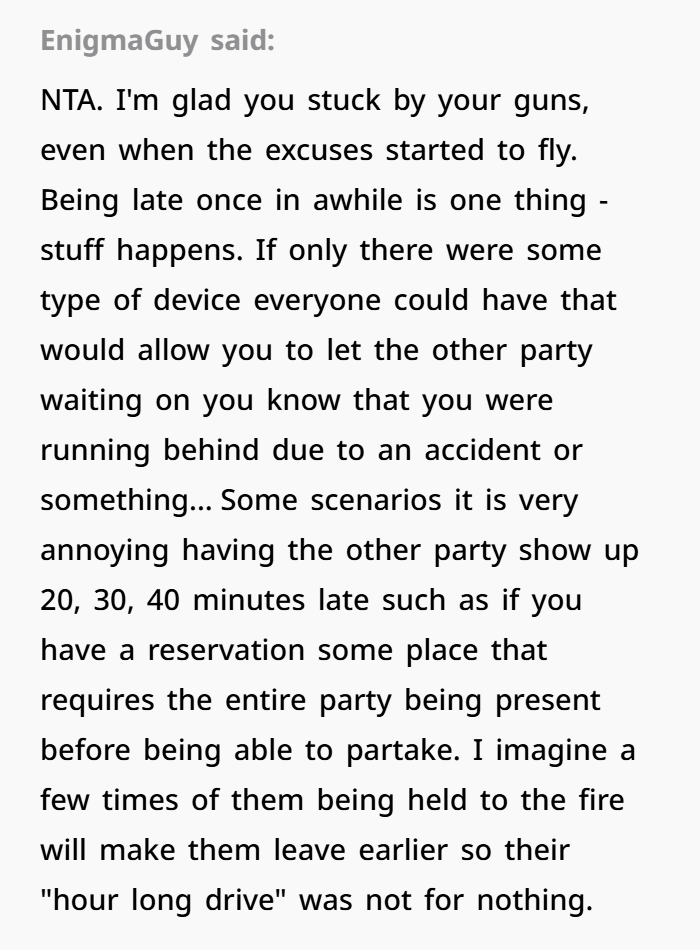
After 16 years of this, OP is correct to draw a line in the sand. Arriving late all the time is a schedule disruptor and indicates that when OP’s in-laws arrive late, it’s because their convenience is more important than OP’s time. And OP had given plenty of warning about the new rule, decided to ignore by the in-laws. This may ruffle a few feathers in the short term as you enforce this boundary — but this sets an example of how to respect other’s time.
OP should also elaborate why timeliness matters and possible compromises that can be taken on (meet 20 mins earlier if in-laws are late). But on this occasion, it was understandable and right that they stood their ground.


